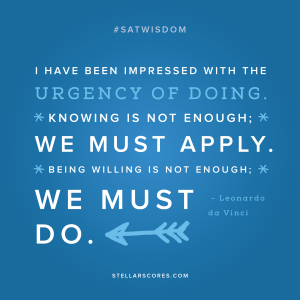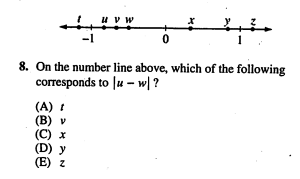Knowing is absolutely different than doing
I was working with a student today on one of my favorite problems from the (old) Official SAT Study Guide, from Test 7, Section 9, Question 8 on page 797:
She chose A. I asked her what those vertical lines meant around the expression u-w. She immediately answered “Oh, that’s absolute value. That means it’s positive.”
Yep.
Then why did you choose a negative number, t, as the correct answer?
The enormous gulf between knowing and doing
This crops up ALL THE TIME.
Students tell me that you lose points for wrong answers on the SAT (NOTE: this was true for the OLD version of the test – you DO NOT lose points for wrong answers on the new version of the test), yet have no explanation for why they answer every single question, even when they KNOW they DON’T KNOW the answer – often racking up 50 negative points which drastically decreases their score.
And it’s not just kids. I do this too.
I’m learning Latin and I can clearly tell you that the singular of the accusative case is am and the plural is as. Which means that “I see the cottage” is translated into “CasaAM video” and “I see the cottagES” is “CasAS video.”
But what do I write when I’m in the middle of translating a passage? I keep writing the singular accusative ending instead of the plural. Every. Bloody. Time
I know exactly why -it’s been such a struggle to wrap my head around a highly inflected language and realize that every word changes depending on how it it used – that I don’t have any space left over to sort out whether it’s singular or plural and change it accordingly. (At this point it’s just a win that I realize I need to use the accusative case!)
The fact that I know something in one area of my brain hasn’t yet migrated over to the part where I’m actively translating. The knowing hasn’t yet integrated into the action.
Practice, not “studying”
It’s exactly the same for the SAT.
It take practice, people!
Repeated practice.
Intellectually knowing something is the first step, but you need to have that knowledge deeply integrated into your actions.
That’s why SAT prep is much more similar to practicing your tennis serve than it is to studying for a history test. You must be “on the court” putting your knowledge into action.
Here’s how to transfer knowledge into action:
- Use authentic materials
- Track your progress
- Figure out WHY you missed each question and what you are going to do DIFFERENTLY to make sure you don’t make that same sort of error again
Need help sorting it out?
PWNtheSAT’s blog is chock-full of math help. The Critical Reader’s blog has great reading and writing tips. Or hire a tutor.
The point is – get out there and start doing!
Want weekly test tips and strategies?
Subscribe to get my latest content by email.

